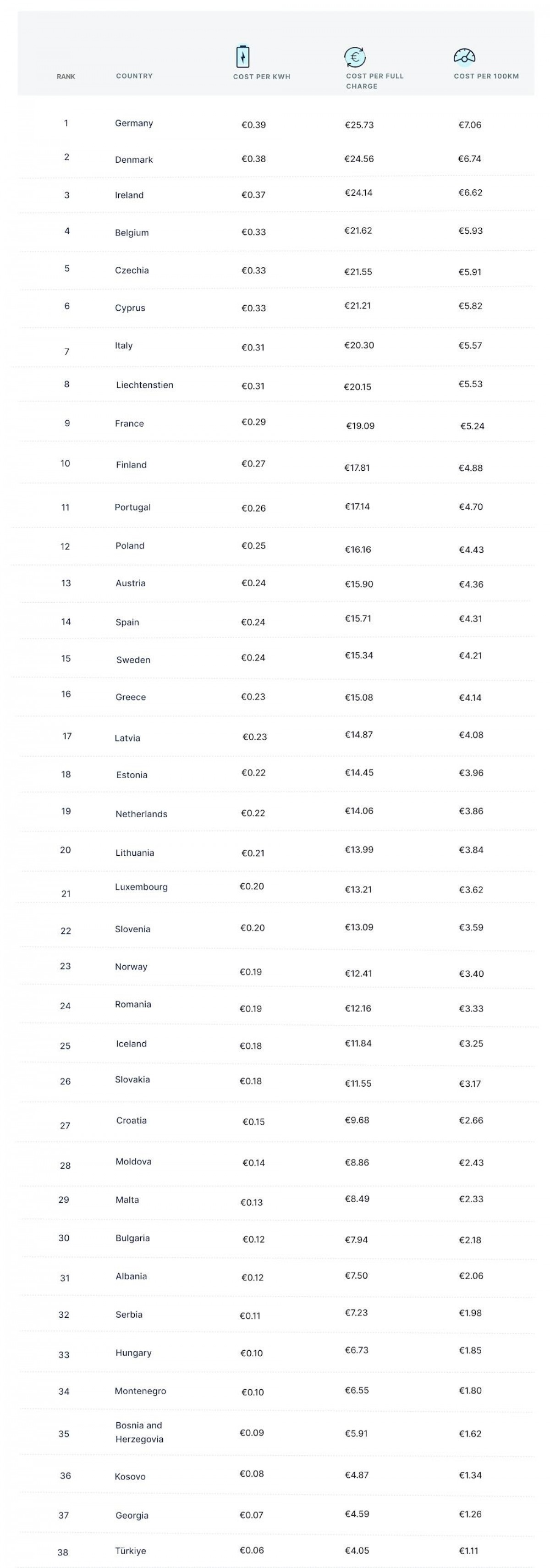Charging EVs is most expensive in Germany, cheapest in Türkiye, EU study finds
Electric cars on European roads are promising cleaner air and, often, cheaper motoring in the long run. But when it comes to "fueling" these EVs, the cost can be a real shocker—or a pleasant surprise—depending on where you plug in. A look across the continent reveals a patchwork of prices for charging your EV at home, showing that not all kilowatts are created equal.
The hum of electric motors is certainly getting louder. In the first quarter of 2025, sales of new BEVs across Europe jumped by nearly 24%. Countries like Germany, Belgium, and the Netherlands saw significant boosts in people choosing electric. It's often said that electric cars can be around 70% cheaper to run than their gasoline or diesel counterparts, but the actual cost to charge an EV at home swings widely from one European nation to another.

Why the big difference in your home charging bill if you live in Berlin versus, say, Istanbul? A variety of factors stir the pot of electricity prices. The way each country generates its power plays a big role – sunny Spain relies on solar while other nations are more dependent on natural gas. Government taxes and any financial help, or subsidies, for energy consumption also heavily influence the final price. Beyond that, how countries get along with each other, changes in global events, the cost of getting electricity through the power lines to your home, and even local rules aimed at protecting the environment can all nudge your electricity bill up or down.
For EV drivers in some parts of Europe, a full charge at home can feel like a luxury. Germany currently holds the top spot for the most expensive home charging, where filling up your EV's battery might cost around $30.14, which works out to roughly $8.27 for every 62 miles driven. Interestingly, after a dip in EV sales in 2024, German consumers are once again warming up to electric cars in 2025, possibly helped by new tax benefits.

Denmark follows closely, with a full charge averaging $28.77 ($7.90 per 62 miles), despite having a high number of electric cars already on its roads. Drivers in Ireland also face higher costs, at about $28.28 for a full charge ($7.76 per 62 miles). Belgium and Czechia are not far behind, with home charging costs exceeding $25 for a full top-up. It seems some places really make you appreciate every electron.
However, it's not all premium prices at the plug. Hop over to Türkiye, and the cost to power your electric car drops dramatically to just about $4.74 for a full charge, or a mere $1.30 per 62 miles. Several other countries, mainly in central and southeastern Europe, also offer much more wallet-friendly charging. For example, in Georgia, a full charge comes in around $5.38 ($1.48 per 62 miles), and in Kosovo, it's approximately $5.71 ($1.57 per 62 miles).
Nations like Bosnia and Herzegovina ($6.92 per full charge) and Montenegro ($7.67) also boast some of the lowest home charging rates. Generally, these are countries where EV adoption is still in its earlier stages, partly because the initial purchase price of electric cars can still be a barrier for many.

It's important to remember that these figures generally refer to charging an EV at your own home, which is typically the most economical option. Venturing out to public charging stations, especially the fast-charging kind, can mean paying up to 60% more, a rule of thumb that applies across most of Europe. The specific make and model of your electric car will also influence charging costs, as larger batteries naturally require more energy to fill.
Despite the sometimes vast differences in charging expenses from one country to the next – ranging from a coffee-and-cake price to a half-decent dinner for two – electric cars generally have an edge in lower running costs compared to traditional gasoline vehicles. As EV sales continue to grow across the continent, the cost of electricity will always be a key part of the ownership experience, alongside the patchwork of government incentives that can tilt the financial scales.
Here is the full list of EV charging costs across Europe:

Reader comments
- Hank53
- pwv
Where exactly are these data coming from? Home charging/ electricity prices are not 39ct€/kWh in Germany. Switcher is using data from BDEW, which includes base fees meaning per kWh costs are significantly lower probably around 22-30ct€/kWh.
- erh
- SiU
More detail on the situation in Türkiye: Electricity is cheaper than Europe, because it's heavily subsidized by taxes. In a recent decision, the government decided that only the first 5000kwh in one year should be subsidized. In p...




Facebook
Twitter
Instagram
RSS
Settings
Log in I forgot my password Sign up